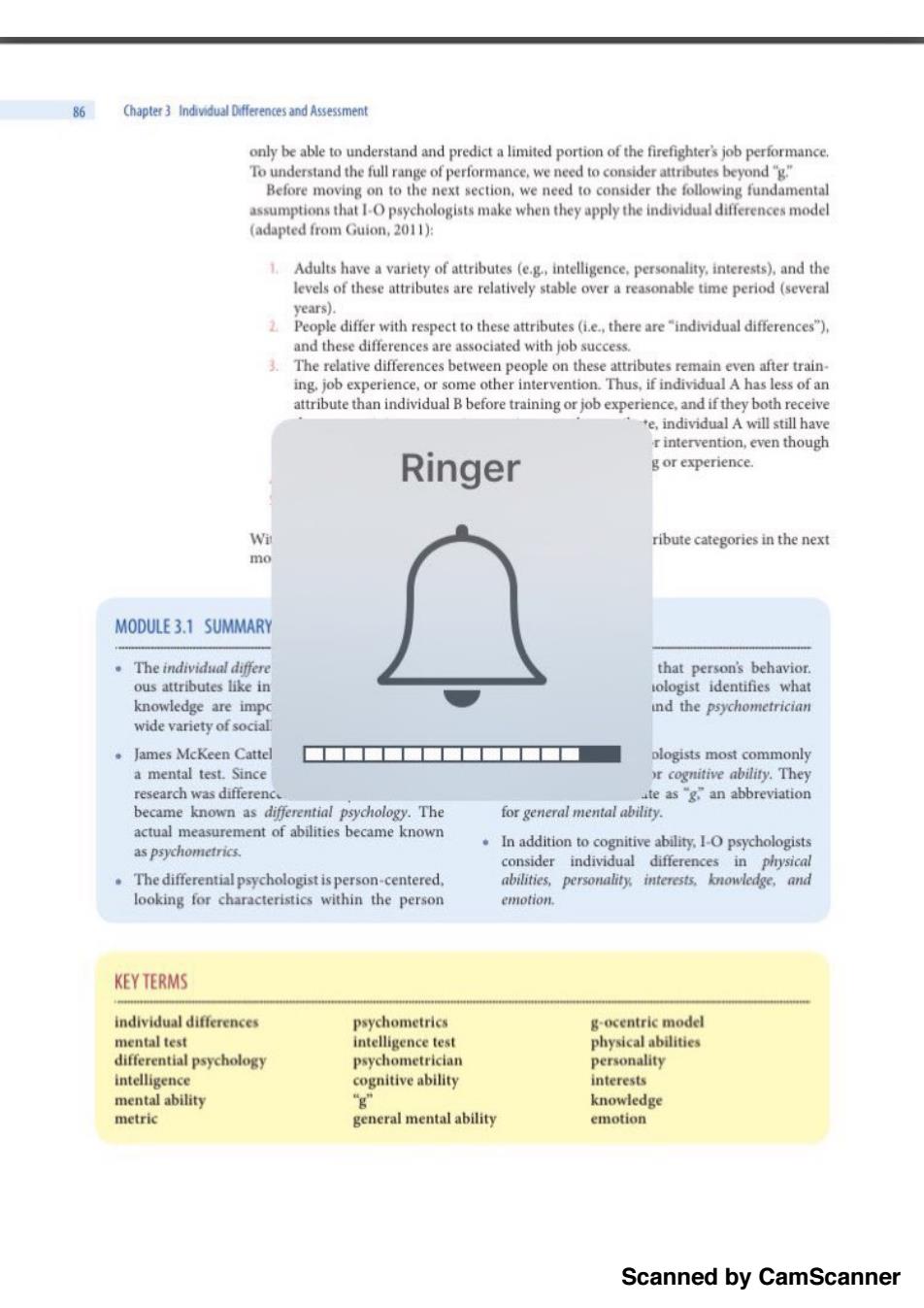
86 Chapter3 Individual Differencesand Assessment only be able to understand and predict a limited portion of the firefighter's job performance. To understand the full range of performance,we need to consider attributes beyond'g" Before moving on to the next section.we need to consider the following fundamental assumptions that I-O psychologists make when they apply the individual differences model (adapted from Guion,2011): 1 Adults have a variety of attributes (e.g.,intelligence,personality,interests).and the levels of these attributes are relatively stable over a reasonable time period (several years). 2 People differ with respect to these attributes(i.e.,there are"individual differences"). and these differences are associated with job success. 3. The relative differences between people on these attributes remain even after train- ing.job experience,or some other intervention.Thus,if individual A has less of an attribute than individual B before training or job experience,and if they both receive e,individual A will still have r intervention,even though Ringer g or experience. Wi ribute categories in the next mo MODULE 3.1 SUMMARY .The individual differe that person's behavior. ous attributes like in ologist identifies what knowledge are impc nd the psychometrician wide variety of social James McKeen Cattel plogists most commonly a mental test.Since orcognitive ability.They research was difference te as'g.an abbreviation became known as differential psychology.The for general mental ability. actual measurement of abilities became known as psychometrics. .In addition to cognitive ability,I-O psychologists consider individual differences in physical The differential psychologist is person-centered. abilities,personality. interests,knowledge,and looking for characteristics within the person emotion. KEY TERMS individual differences psychometrics g-ocentric model mental test intelligence test physical abilities differential psychology psychometrician personality intelligence cognitive ability interests mental ability g” knowledge metric general mental ability emotion Scanned by CamScanner
Scanned by CamScanner
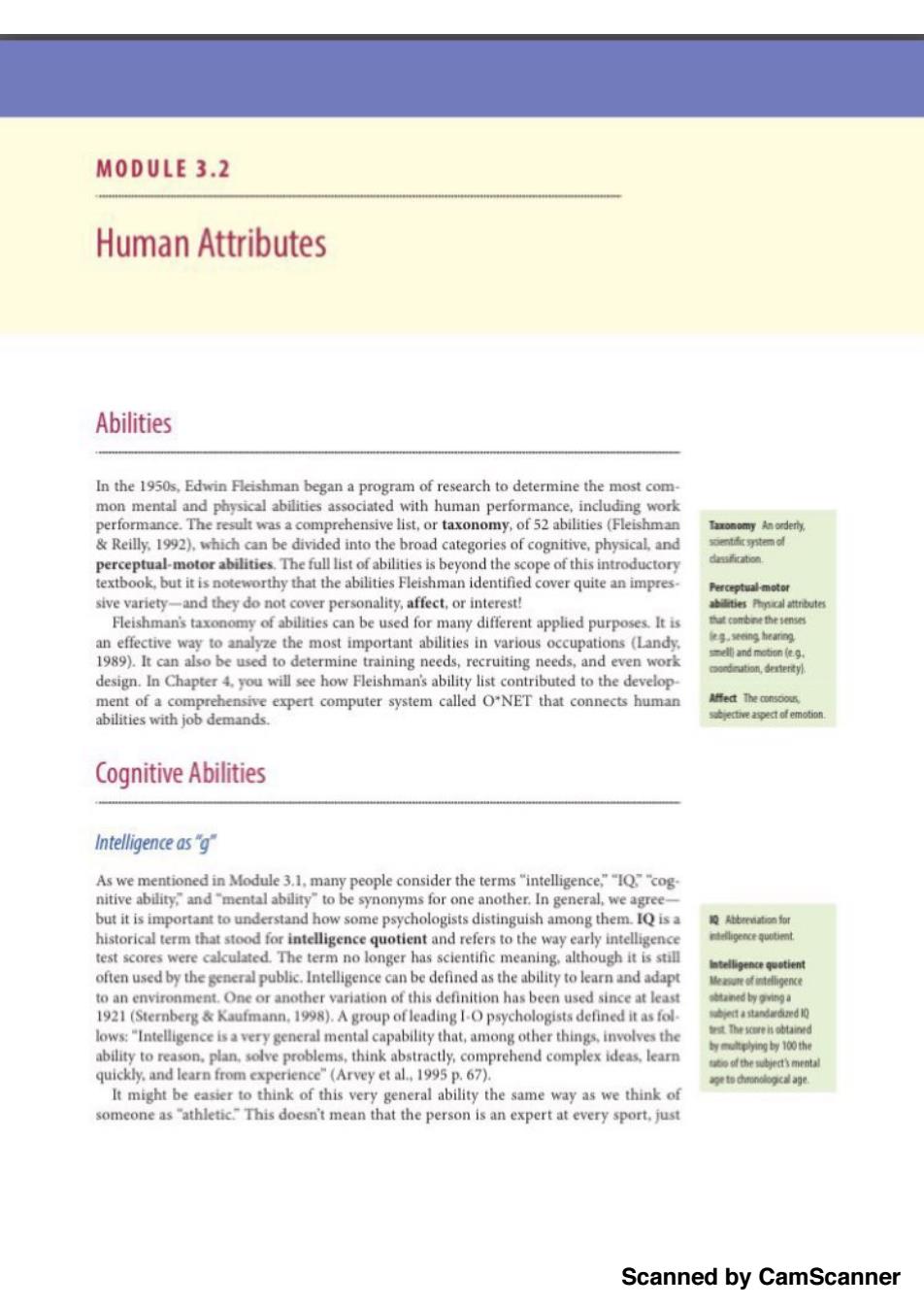
MODULE 3.2 Human Attributes Abilities In the 1950s,Edwin Fleishman began a program of research to determine the most com- mon mental and physical abilities associated with human performance,including work performance.The result was a comprehensive list,or taxonomy,of 52 abilities(Fleishman owo可norderty Reilly.1992),which can be divided into the broad categories of cognitive,physical,and t血td perceptual-motor abilities.The full list of abilities is beyond the scope of this introductory textbook,but it is noteworthy that the abilities Fleishman identified cover quite an impres- Perceptual-motor sive variety-and they do not cover personality,affect,or interest! abties Pical attrbutes Fleishman's taxonomy of abilities can be used for many different applied purposes It is that combne the senses an effective way to analyze the most important abilities in various occupations (Landy. legseeing hearing 1989).It can also be used to determine training needs,recruiting needs,and even work -and motion使g. design.In Chapter 4.you will see how Fleishman's ability list contributed to the develop- ment of a comprehensive expert computer system called O'NET that connects human Affect The consoous abilities with job demands. sjective aspect of emotinn Cognitive Abilities Intelligenceas As we mentioned in Module 3.1.many people consider the terms"intelligence,""IQ."cog- nitive ability,and "mental ability"to be synonyms for one another.In general,we agree- but it is important to understand how some psychologists distinguish among them.IQ is a 段比o historical term that stood for intelligence quotient and refers to the way early intelligence elligencequutimnt test scores were calculated.The term no longer has scientific meaning,although it is still telligence qutient often used by the general public.Intelligence can be defined as the ability to learn and adapt n威时ligence to an environment.One or another variation of this definition has been used since at least ady9的t 1921 (Sternberg Kaufmann.1998).A group of leading I-O psychologists defined it as fol. bject a standardized 1 lows:"Intelligence is a very general mental capability that,among other things,involves the 量The scure isobta的ed 与n的ng与60the ability to reason.plan.solve problems,think abstractly,comprehend complex ideas,learn of the sbiects mental quickly,and learn from experience"(Arvey et al.,1995 p.67). tedhnoogcala明 It might be easier to think of this very general ability the same way as we think of someone as "athletic."This doesn't mean that the person is an expert at every sport,just Scanned by CamScanner
Scanned by CamScanner
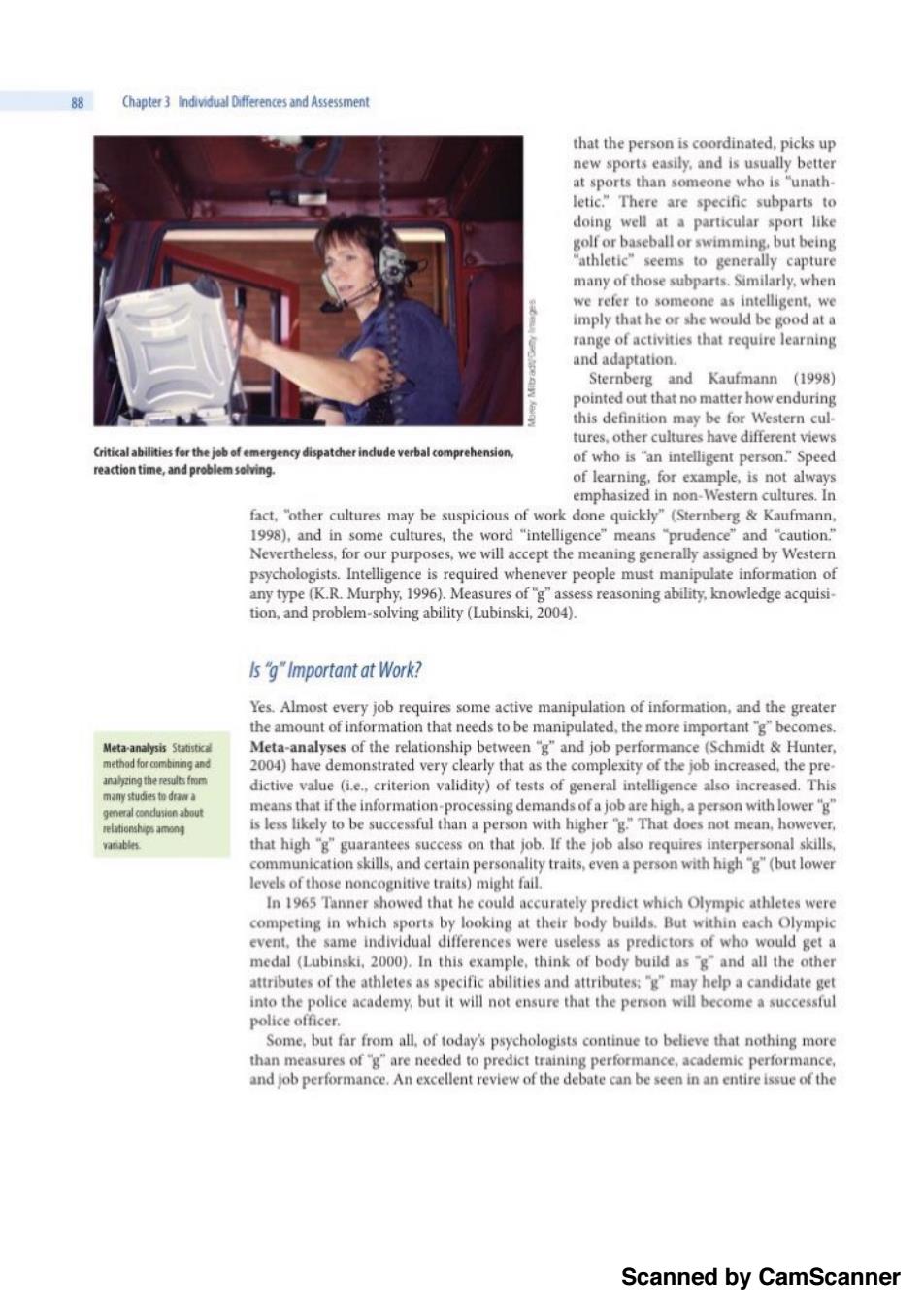
88 Chapter3 Individual Differencesand Assessment that the person is coordinated,picks up new sports easily.and is usually better at sports than someone who is "unath- letic."There are specific subparts to doing well at a particular sport like golf or baseball or swimming.but being "athletic"seems to generally capture many of those subparts.Similarly,when we refer to someone as intelligent,we imply that he or she would be good at a range of activities that require learning and adaptation. Sternberg and Kaufmann (1998) pointed out that no matter how enduring this definition may be for Western cul. tures,other cultures have different views Critical abilities for the job of emergency dispatcher indude verbal comprehension. of who is "an intelligent person."Speed reaction time,and problem solving. of learning,for example,is not always emphasized in non-Western cultures.In fact,"other cultures may be suspicious of work done quickly"(Sternberg Kaufmann, 1998),and in some cultures,the word "intelligence"means "prudence"and "caution." Nevertheless,for our purposes,we will accept the meaning generally assigned by Western psychologists.Intelligence is required whenever people must manipulate information of any type (K.R.Murphy,1996).Measures of"g"assess reasoning ability,knowledge acquisi- tion,and problem-solving ability (Lubinski,2004) Is g"Important at Work? Yes.Almost every job requires some active manipulation of information,and the greater the amount of information that needs to be manipulated,the more important'g"becomes. Meta-analysis Statistica Meta-analyses of the relationship between "g"and job performance (Schmidt Hunter, method for combining and 2004)have demonstrated very clearly that as the complexity of the job increased,the pre- analzing the resul色fom dictive value (i.e.,criterion validity)of tests of general intelligence also increased.This ma呼uds自dawa general condusion about means that if the information-processing demands of a job are high,a person with lower'"g" relationshpamng is less likely to be successful than a person with higher'g."That does not mean,however. variables that high "g"guarantees success on that job.If the job also requires interpersonal skills, communication skills,and certain personality traits,even a person with high"g"(but lower levels of those noncognitive traits)might fail. In 1965 Tanner showed that he could accurately predict which Olympic athletes were competing in which sports by looking at their body builds.But within each Olympic event,the same individual differences were useless as predictors of who would get a medal (Lubinski,2000).In this example,think of body build as'g"and all the other attributes of the athletes as specific abilities and attributes:'g"may help a candidate get into the police academy,but it will not ensure that the person will become a successful police officer. Some,but far from all,of today's psychologists continue to believe that nothing more than measures ofg"are needed to predict training performance,academic performance, and job performance.An excellent review of the debate can be seen in an entire issue of the Scanned by CamScanner
Scanned by CamScanner
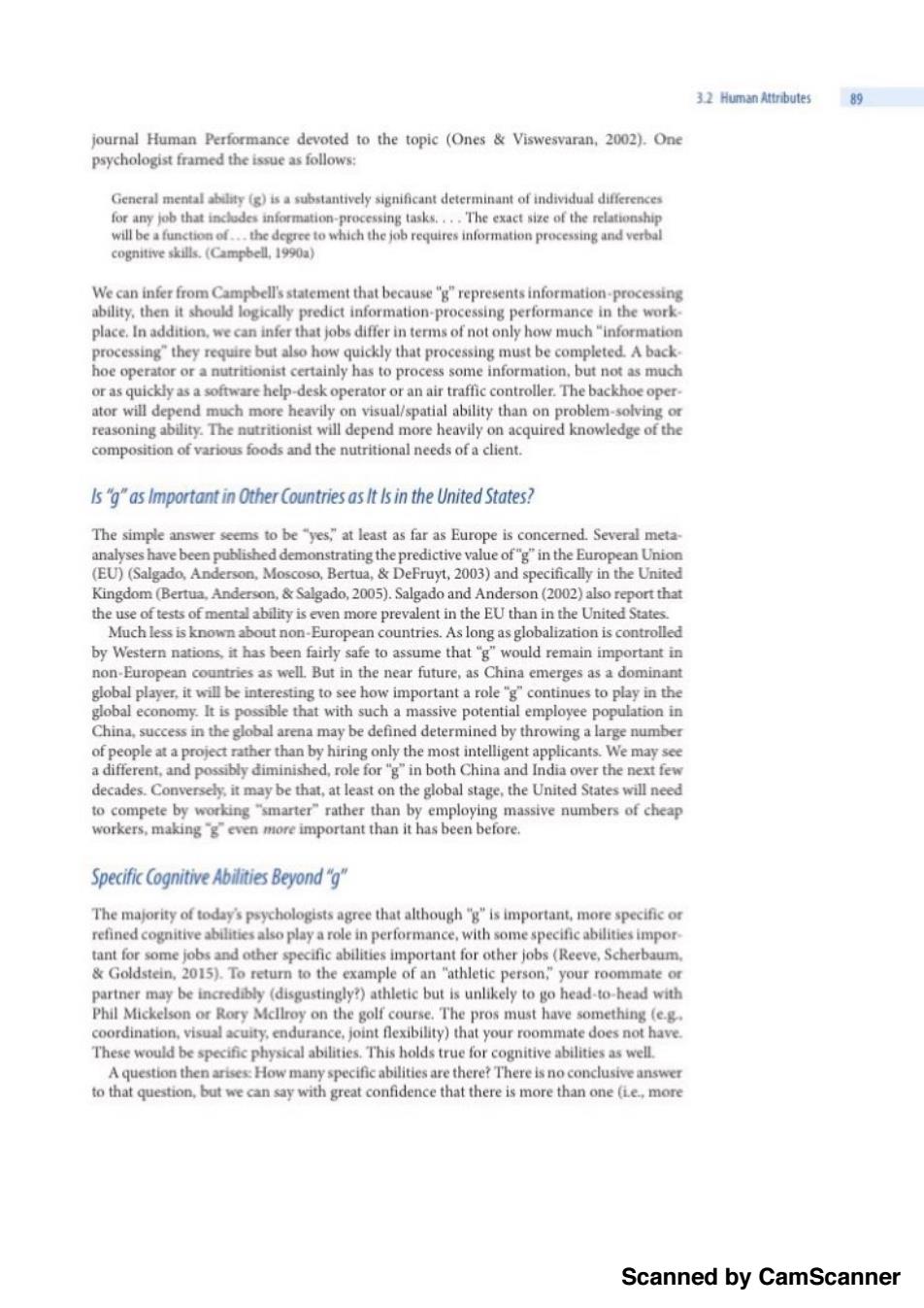
3.2 Human Attributes 9 journal Human Performance devoted to the topic (Ones Viswesvaran,2002).One psychologist framed the issue as follows: General mental ability (g)is a substantively significant determinant of individual differences for any job that incldes information-processing tasks....The exact size of the relationship will be a function of...the degree to which the job requires information processing and verbal cognitive skills.(Campbell,1990a) We can infer from Campbell's statement that because "g"represents information-processing ability.then it should logically predict information-processing performance in the work- place.In addition.we can infer that jobs differ in terms of not only how much"information processing"they require but also how quickly that processing must be completed.A back. hoe operator or a nutritionist certainly has to process some information.but not as much or as quickly as a software help-desk operator or an air traffic controller.The backhoe oper. ator will depend much more heavily on visual/spatial ability than on problem-solving or reasoning ability.The nutritionist will depend more heavily on acquired knowledge of the composition of various foods and the nutritional needs of a client. Is g"as Important in Other Countries as It Is in the United States? The simple answer seems to be "yes,"at least as far as Europe is concerned.Several meta- analyses have been published demonstrating the predictive value of "g"in the European Union (EU)(Salgado,Anderson,Moscoso,Bertua,&DeFruyt,2003)and specifically in the United Kingdom(Bertua.Anderson,Salgado,2005).Salgado and Anderson(2002)also report that the use of tests of mental ability is even more prevalent in the EU than in the United States. Much less is known about non-European countries.As long as globalization is controlled by Western nations,it has been fairly safe to assume that'g"would remain important in non-European countries as well.But in the near future,as China emerges as a dominant global player,it will be interesting to see how important a role'g"continues to play in the global economy.It is possible that with such a massive potential employee population in China,success in the global arena may be defined determined by throwing a large number of people at a project rather than by hiring only the most intelligent applicants.We may see a different,and possibly diminished,role for'g"in both China and India over the next few decades.Conversely,it may be that,at least on the global stage,the United States will need to compete by working "smarter"rather than by employing massive numbers of cheap workers,making 'g"even more important than it has been before. Specific Cognitive Abilities Beyond "g" The majority of today's psychologists agree that although 'g"is important,more specific or refined cognitive abilities also play a role in performance,with some specific abilities impor- tant for some jobs and other specific abilities important for other jobs(Reeve,Scherbaum. Goldstein,2015).To return to the example of an "athletic person,"your roommate or partner may be incredibly (disgustingly?)athletic but is unlikely to go head-to-head with Phil Mickelson or Rory Mcllroy on the golf course.The pros must have something (e-g. coordination,visual acuity,endurance,joint flexibility)that your roommate does not have. These would be specific physical abilities.This holds true for cognitive abilities as well. A question then arises:How many specific abilities are there?There is no conclusive answer to that question,but we can say with great confidence that there is more than one (ie,more Scanned by CamScanner
Scanned by CamScanner
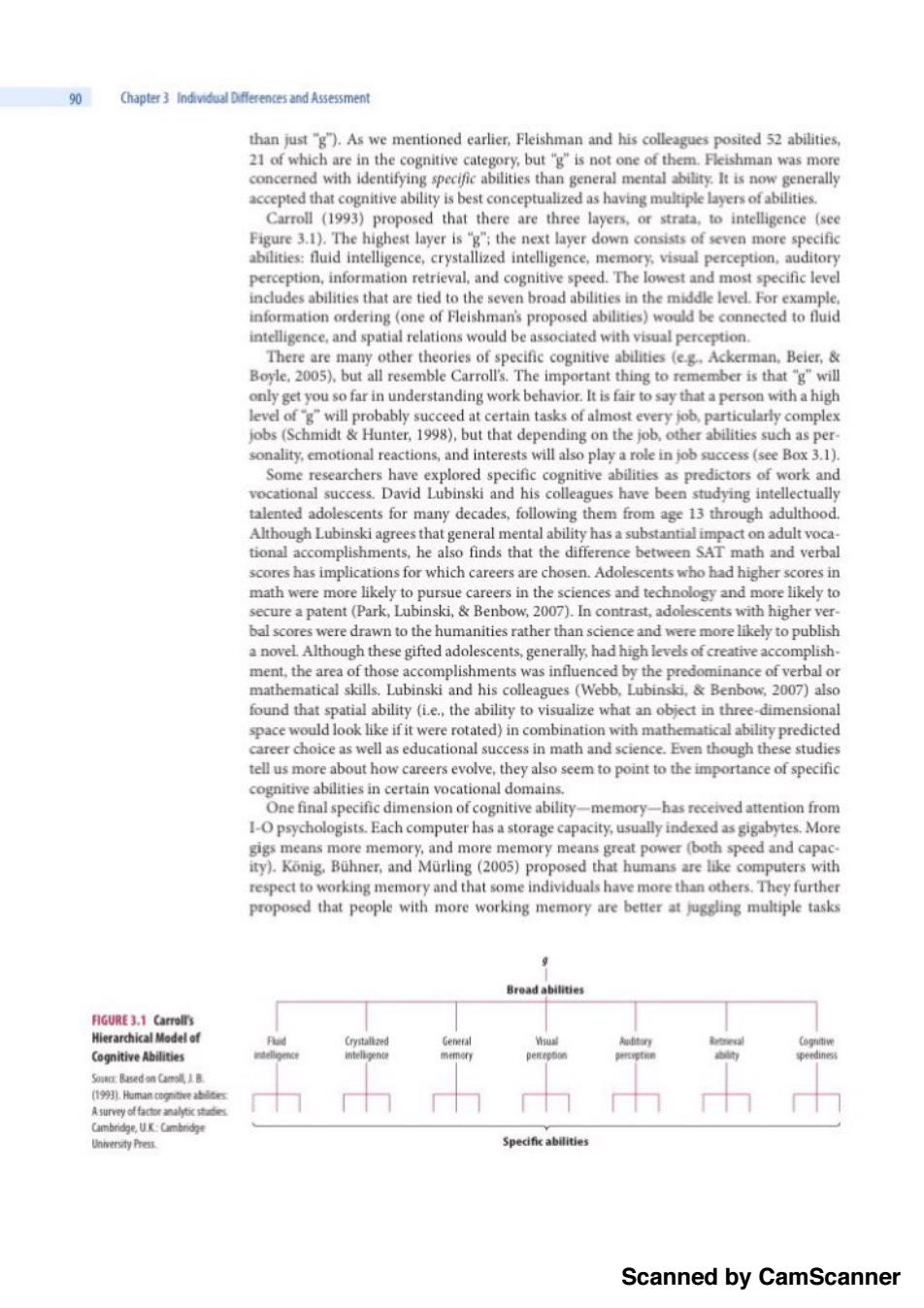
Chapter3 Individual Dfferences and Assessment than just "g").As we mentioned earlier,Fleishman and his colleagues posited 52 abilities, 21 of which are in the cognitive category,but "g"is not one of them.Fleishman was more concerned with identifying specific abilities than general mental ability.It is now generally accepted that cognitive ability is best conceptualized as having multiple layers of abilities. Carroll (1993)proposed that there are three layers,or strata.to intelligence (see Figure 3.1).The highest layer is 'g";the next layer down consists of seven more specific abilities:fluid intelligence,crystallized intelligence,memory,visual perception,auditory perception,information retrieval,and cognitive speed.The lowest and most specific level includes abilities that are tied to the seven broad abilities in the middle level.For example, information ordering (one of Fleishman's proposed abilities)would be connected to fluid intelligence,and spatial relations would be associated with visual perception. There are many other theories of specific cognitive abilities (eg.Ackerman.Beier, Boyle,2005),but all resemble Carroll's.The important thing to remember is that 'g"will only get you so far in understanding work behavior.It is fair to say that a person with a high level of'g"will probably succeed at certain tasks of almost every job,particularly complex jobs(Schmidt Hunter,1998),but that depending on the job,other abilities such as per- sonality,emotional reactions,and interests will also play a role in job success(see Box 3.1). Some researchers have explored specific cognitive abilities as predictors of work and vocational success.David Lubinski and his colleagues have been studying intellectually talented adolescents for many decades,following them from age 13 through adulthood Although Lubinski agrees that general mental ability has a substantial impact on adult voca. tional accomplishments,he also finds that the difference between SAT math and verbal scores has implications for which careers are chosen.Adolescents who had higher scores in math were more likely to pursue careers in the sciences and technology and more likely to secure a patent(Park,Lubinski,Benbow,2007).In contrast,adolescents with higher ver bal scores were drawn to the humanities rather than science and were more likely to publish a novel Although these gifted adolescents,generally,had high levels of creative accomplish- ment,the area of those accomplishments was influenced by the predominance of verbal or mathematical skills.Lubinski and his colleagues (Webb.Lubinski,Benbow.2007)also found that spatial ability (i.e.,the ability to visualize what an object in three-dimensional space would look like if it were rotated)in combination with mathematical ability predicted career choice as well as educational success in math and science.Even though these studies tell us more about how careers evolve,they also seem to point to the importance of specific cognitive abilities in certain vocational domains. One final specific dimension of cognitive ability-memory-has received attention from 1-0 psychologists.Each computer has a storage capacity,usually indexed as gigabytes.More gigs means more memory,and more memory means great power (both speed and capac. ity).Konig.Buhner,and Murling(2005)proposed that humans are like computers with respect to working memory and that some individuals have more than others.They further proposed that people with more working memory are better at juggling multiple tasks Bread abilities 月GURE3.1 Carroll Hierarchical Model of Crystallized General Cognitive Abilities Souner:Based on Caroll 1B l月.Human citive abtes A survey of factor analytic中s Cambridge,UK:Cambridge Uniersty Press. Specific abilities Scanned by CamScanner
Scanned by CamScanner